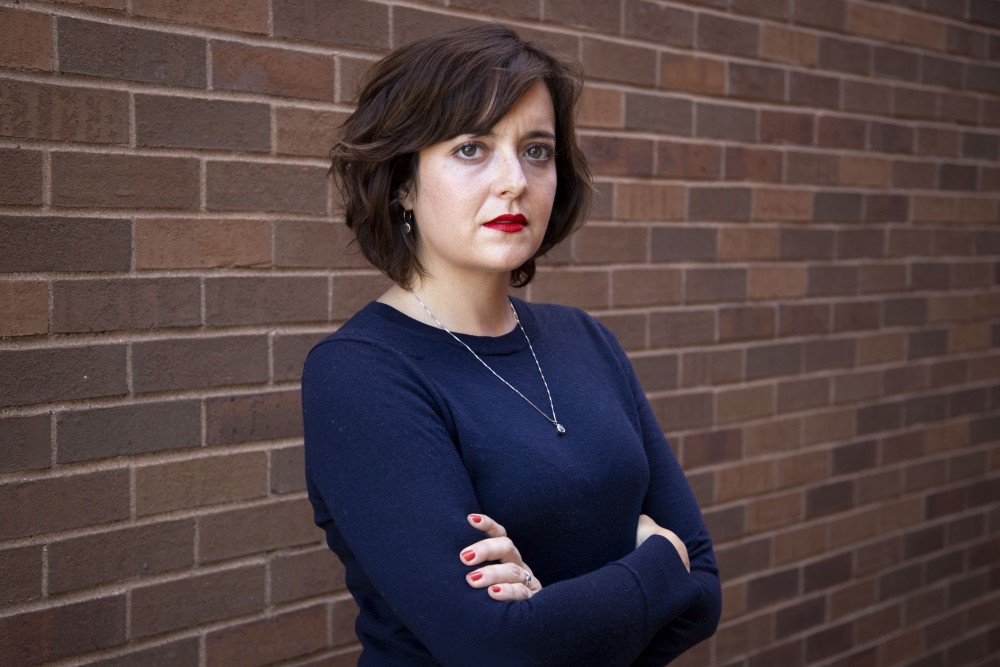This is part one of a two part story.
Nora Radtke was close to getting her master’s of human rights last May.
Around that time, she was preparing to fly to New York with her fellow graduate students to present their capstone project. Radtke had been offered a research job with James Ron, a tenured human rights professor at the University of Minnesota’s Humphrey School of Public Affairs.
A dream job, she said.
But after discussing the opportunity, Radtke said Ron shifted the topic of conversation — to his lingering feelings for her. Then Ron told her if she were single, he would ask her out.
“It felt like the ground opened up,” Radtke said. She thought, “Oh, this is what this has all been about. This has not been about my academic work. This hasn’t been about my professional development. This isn’t about my professional future. This has all been about you being romantically interested.”
Humphrey administration determined Ron could not attend the class presentation after Radtke told administrators about Ron’s comment. Still, Radtke stayed home fearing Ron would show up at the event.
For Radtke, this was the last straw after what she described as months of alleged sexual harassment by Ron, her adviser and teacher at Humphrey. Days later, Radtke filed a report with the University’s Office of Equal Opportunity and Affirmative Action.
“I would be totally fucked if something happened with this relationship,” Radtke said. “This is a person who is my academic adviser. This is the person who was my professional reference. This is the person that I’ve committed to work with … I just really want that to be clear — just how much power he had.”
Two professors, two unpaid suspensions
Ron was suspended from teaching by the administration for sexual harassment, but he was not the only Humphrey professor disciplined.
Jason Cao, a tenured professor of urban and regional planning at Humphrey, allegedly sexually harassed a student between summer 2013 and spring 2016, according to a discipline letter sent to him by Humphrey Dean Laura Bloomberg.
The EOAA recommends discipline, which supervisors can choose to administer at their discretion.
Both professors were placed on unpaid leave at the beginning of 2019 by the University following separate, unrelated EOAA investigations into their conduct. Cao received an eight month suspension and Ron a five month suspension. The two professors returned to teach at Humphrey this fall.
According to EOAA official language, Ron and Cao “more likely than not” violated the University’s sexual harassment policies.
After consultation with tenured Humphrey faculty, Bloomberg concluded both professors should be suspended without pay. EOAA guidance letters did not recommend termination as an option, and Bloomberg herself said she never considered it in these cases.
“We are not going to fire our way out of a sexual misconduct issue in higher education,” Bloomberg said. “I absolutely believe that people who egregiously violate policies sometimes need to be terminated. I did not personally, in this case, believe that was warranted.”
Cao made several sexual jokes and commented that the student should be “submissive,” the discipline letter says. It goes on to say he directed the student to touch his leg to show how “strong and big” his muscles were.
Cao also invited himself to the student’s home because he was “in the neighborhood,” the letter says. Cao denied some of the allegations made in the letter, but the EOAA concluded the student’s account was more credible.
Ron made unwelcome comments and created a hostile work and learning environment, according to the discipline letter Bloomberg sent to Ron. He denied one of the several findings of alleged sexual harassment in EOAA documents obtained by the Minnesota Daily.
“While I now see how these conversations were inappropriate, the student herself told investigators that I was not a predator, but that I did not fully understand my position of power in an academic setting,” Ron said in a written statement to the Daily through a spokesperson.
Cao declined to comment for this story.
Crossing boundaries
Ron crossed professional boundaries with Radtke several times while she was a student, according to the letter of discipline.
She was the student, he was the professor, Radtke said. They were never friends.
Before filing a formal EOAA report in May 2018, Radtke expressed her concerns about Ron’s behavior to Humphrey administration in March. This prompted meetings including Radtke, Ron and administration about appropriate boundaries. To Radtke, these meetings seemed effective.
“We didn’t really talk about it after that, and [I] continued to work for him,” Radtke said. “Then the dynamic changed, he was very sort of withdrawn, very cool, very disconnected for a few weeks.”
Ron’s friendliness then returned and with it the familiar, unprofessional behavior, Radtke said.
In conversations with Radtke, Ron discussed sexual relations that he had with a woman he met online, according to the disciplinary letter.
He also talked about how difficult it was to have sex with a woman who was not his wife, and invited Radtke to move into his home to rent from him while he was going through a divorce, the disciplinary letter says.
“I think there should be limits to that level of friendship because there is a power relationship,” said Ragui Assaad, a tenured professor at Humphrey who serves as one of Ron’s post-discipline faculty mentors. “Friends talk to each other about things that professors and students should not talk to each other about.”
Moving forward
Both Cao and Ron have returned to teaching, but with caveats.
Both professors are prohibited from advising students in some form and supervising student research for two years, according to the letters of discipline. Bloomberg required them to create professional development plans, which will include meetings with faculty mentors she chooses, as well as additional training and readings to gain an understanding of sexual misconduct on campuses nationwide.
“If there is something that doesn’t feel safe in the learning environment, we would really like to know about it and really like to demonstrate that we take it very seriously,” Bloomberg said.
Assaad said they will have periodic meetings to discuss Ron’s progress on his development plan.
“I am neither an advocate for him, nor am I a monitor of his behavior,” Assad said, who sees his role as an adviser to Ron and the dean.
The University has made arrangements so students are not required to take a class with Ron, according to Humphrey administration.
“With this matter now behind me, I have returned to full-time teaching cognizant of not only how conversations of a personal nature, particularly with students, can be misunderstood, but of the boundaries that should be maintained between professor and student,” said Ron in a written statement.
Last fall, while Ron was not at the school, Radtke returned to Humphrey for a fresh start. Radtke said she wanted to take different classes and build new connections unrelated to Ron’s work.
“I was so pissed, because all of my classes that I had taken were in relation to the work I was doing with Jim,” Radtke said.
School became too overwhelming and she wanted to find full-time employment. The stress piled up, and Radtke stopped going to class.
She has not been back since.
“No one tells you that when you report sexual harassment … these are the consequences of reporting,” Radtke said.
While she has not moved on, her current job in civil rights has helped. She is training to help support survivors of sexual violence. Someday, she hopes to complete her master’s degree at Humphrey.
“The human rights community isn’t just Jim’s,” Radtke said. “It’s mine too.”
Audrey Kennedy contributed to this story.













